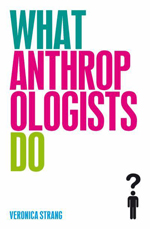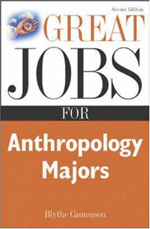While a few anthropology postgraduates go on to work as lecturers or researchers within academia, a significant number are increasingly finding employment in a variety of sectors, ranging from education, charity and international development to medicine, film and business. Often anthropologists do not follow linear career trajectories, but become involved in various projects in frequently overlapping career sectors.
Becoming an anthropologist means that you must be willing to adapt and explore different career possiblities and at the same time be willing to learn how to apply your skills and knowledge to a specific job. In certain sectors, such as health, or business, you may have to supplement your anthropological training with additional skills and knowledge in order to gain management positions or positions that warrant more responsibility.
The following resources provide general information on careers in anthropology. For specific resources, case studies and information on certain professions take a look at our pages on various careers sectors.
Recomended Resources
Film
This film gives an overview of what anthropologists and arcaheologists can do for careers.
Books



What Anthropologists do? by: Strang, V. (Berg, 2009)
Great Jobs for Anthropology Majors by:Camenson, B. (McGraw-Hill Contemporary, 2004)
Careers in Anthropology by: Stephens, W. R. (Prentice Hall, 2001)
Anthropology Career Resources Handbook by:Gwynne, A. M. (Allyn & Bacon, 2003)
A guide to careers in physical anthropology by:Ryan, A. S. (Bergin & Garvey, 2001)
Anthropology in Practice: Building a Career Outside the Academy by: Nollan R. W. (Lynne Rienner Publications, 2003)
Careers in Anthropology by:Omohundro J. T. (Mayfield Publishing Co, 1998)
General
http://weber.ucsd.edu/~jmoore/bioanthro/brochure2.html – provides information for physical anthropology students of career opportunities in non-academic settings.
Articles
https://www.scribd.com/document/47815164/An-Essay-on-Careers2 – An essay on anthropology careers by Gary Ferraro.
Professional Organisations, Associations, and Groups
The American Anthropological Association – the world’s largest association of individuals interested in the advancement of anthropology as the science that studies humankind in all its aspects, through archeological, biological, ethnological, and linguistic research.
The Association of Social Anthropologists of the UK and Commonwealth – The ASA aims to promote the study and teaching of social anthropology, to present the interests of social anthropology and to maintain its professional status.
The Economic and Social Research Council – The ESRC is the UK’s leading agency for research funding and training in the economic and social sciences
The European Anthropological Association– a scientific organisation which aims to promote research and teaching in anthropology in the different European countries and to promote exchanges of information, workshops, scientific congresses, and schools at postgraduate level
The European Association of Social Anthropologists – a professional association open to all social anthropologists either qualified in, or working in, Europe.
National Association for the Practice of Anthropology (NAPA) – An organization dedicated to the Practice of Anthropology in its most inclusive sense.
The Royal Anthropological Institute of Great Britain and Ireland (RAI) – is the world’s longest-established scholarly association dedicated to the furtherance of anthropology (the study of humankind) in its broadest and most inclusive sense.
World Council of Anthropological Associations (WCAA) – network of national and international associations that aims to promote worldwide communication and cooperation in anthropology

